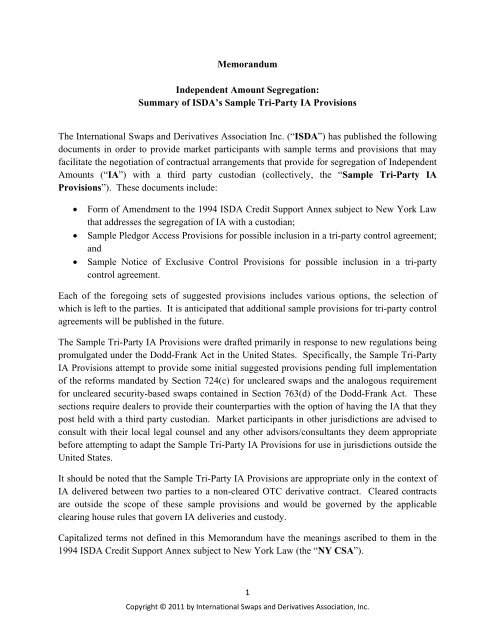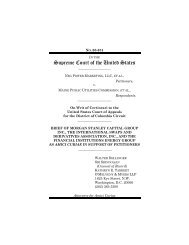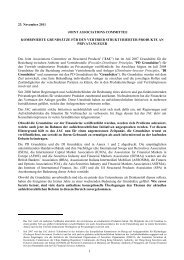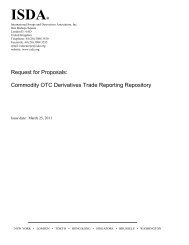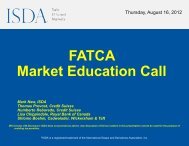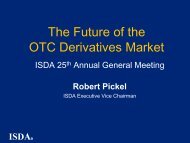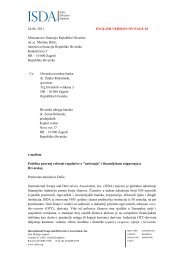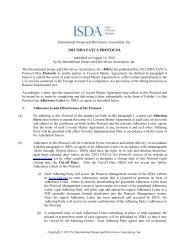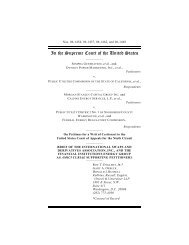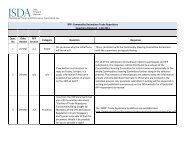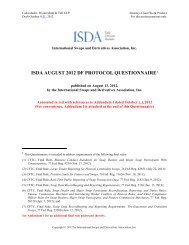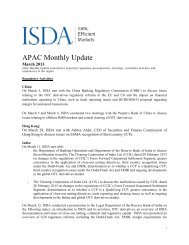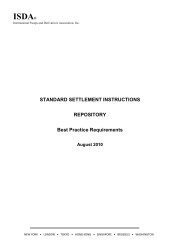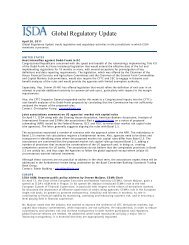ISDA Sample Tri-Party Provisions Memo - Managed Funds ...
ISDA Sample Tri-Party Provisions Memo - Managed Funds ...
ISDA Sample Tri-Party Provisions Memo - Managed Funds ...
Create successful ePaper yourself
Turn your PDF publications into a flip-book with our unique Google optimized e-Paper software.
<strong>Memo</strong>randum<br />
Independent Amount Segregation:<br />
Summary of <strong>ISDA</strong>’s <strong>Sample</strong> <strong>Tri</strong>-<strong>Party</strong> IA <strong>Provisions</strong><br />
The International Swaps and Derivatives Association Inc. (“<strong>ISDA</strong>”) has published the following<br />
documents in order to provide market participants with sample terms and provisions that may<br />
facilitate the negotiation of contractual arrangements that provide for segregation of Independent<br />
Amounts (“IA”) with a third party custodian (collectively, the “<strong>Sample</strong> <strong>Tri</strong>-<strong>Party</strong> IA<br />
<strong>Provisions</strong>”). These documents include:<br />
<br />
<br />
<br />
Form of Amendment to the 1994 <strong>ISDA</strong> Credit Support Annex subject to New York Law<br />
that addresses the segregation of IA with a custodian;<br />
<strong>Sample</strong> Pledgor Access <strong>Provisions</strong> for possible inclusion in a tri-party control agreement;<br />
and<br />
<strong>Sample</strong> Notice of Exclusive Control <strong>Provisions</strong> for possible inclusion in a tri-party<br />
control agreement.<br />
Each of the foregoing sets of suggested provisions includes various options, the selection of<br />
which is left to the parties. It is anticipated that additional sample provisions for tri-party control<br />
agreements will be published in the future.<br />
The <strong>Sample</strong> <strong>Tri</strong>-<strong>Party</strong> IA <strong>Provisions</strong> were drafted primarily in response to new regulations being<br />
promulgated under the Dodd-Frank Act in the United States. Specifically, the <strong>Sample</strong> <strong>Tri</strong>-<strong>Party</strong><br />
IA <strong>Provisions</strong> attempt to provide some initial suggested provisions pending full implementation<br />
of the reforms mandated by Section 724(c) for uncleared swaps and the analogous requirement<br />
for uncleared security-based swaps contained in Section 763(d) of the Dodd-Frank Act. These<br />
sections require dealers to provide their counterparties with the option of having the IA that they<br />
post held with a third party custodian. Market participants in other jurisdictions are advised to<br />
consult with their local legal counsel and any other advisors/consultants they deem appropriate<br />
before attempting to adapt the <strong>Sample</strong> <strong>Tri</strong>-<strong>Party</strong> IA <strong>Provisions</strong> for use in jurisdictions outside the<br />
United States.<br />
It should be noted that the <strong>Sample</strong> <strong>Tri</strong>-<strong>Party</strong> IA <strong>Provisions</strong> are appropriate only in the context of<br />
IA delivered between two parties to a non-cleared OTC derivative contract. Cleared contracts<br />
are outside the scope of these sample provisions and would be governed by the applicable<br />
clearing house rules that govern IA deliveries and custody.<br />
Capitalized terms not defined in this <strong>Memo</strong>randum have the meanings ascribed to them in the<br />
1994 <strong>ISDA</strong> Credit Support Annex subject to New York Law (the “NY CSA”).<br />
1<br />
Copyright © 2011 by International Swaps and Derivatives Association, Inc.
1. BACKGROUND<br />
A. IA White Paper<br />
Risks associated with IA and the recent regulatory responses to this issue have given rise to more<br />
frequent requests for segregation of IA in recent years. In March 2010 <strong>ISDA</strong>, in conjunction<br />
with the Securities Industry and Financial Markets Association (“SIFMA”) and <strong>Managed</strong> <strong>Funds</strong><br />
Association (“MFA”), released a white paper which recommended in part that <strong>ISDA</strong>, SIFMA,<br />
MFA and market participants “develop standard provisions that may be incorporated into<br />
documents for Third <strong>Party</strong> Custodian and <strong>Tri</strong>-<strong>Party</strong> Collateral Agent IA holding arrangements”<br />
(the “IA White Paper”, available at http://www.isda.org/c_and_a/pdf/Independent-Amount-<br />
WhitePaper-Final.pdf). A working group comprised of representatives of <strong>ISDA</strong> member firms<br />
(including swap dealers, buy-side firms and custodian firms) was formed in direct response to<br />
this recommendation (the “IA Working Group”). The IA Working Group focused primarily on<br />
the fundamental contractual provisions of a tri-party custody arrangement, and the <strong>Sample</strong> <strong>Tri</strong>-<br />
<strong>Party</strong> IA <strong>Provisions</strong> are the result of these efforts. For certain of the key contractual provisions,<br />
there are various options provided to address a particular issue, and the range of options is<br />
reflective of the diverse views of the members of the IA Working Group. The <strong>Sample</strong> <strong>Tri</strong>-<strong>Party</strong><br />
IA <strong>Provisions</strong> should not be taken as representing the views of any one <strong>ISDA</strong> member firm or<br />
group of firms or the whole or any segment of the derivatives market.<br />
B. Summary of Alternative Holding Arrangements for IA<br />
As discussed at length in the IA White Paper, a range of alternative holding arrangements for IA<br />
are available for firms to bilaterally negotiate depending on risk and cost appetites and regulatory<br />
constraints. The various alternatives can be categorized based on the three primary ways in<br />
which IA may be held: (i) direct holding, in which the IA is delivered by the pledgor to the<br />
secured party, and the secured party holds the IA itself or through an affiliated entity, (ii) third<br />
party custody, in which an unaffiliated bank, broker-dealer or other party operates under an<br />
agreement with one of the two counterparties and provides typical custody and safekeeping<br />
services, and (iii) tri-party custody, in which an unaffiliated bank or other party providing triparty<br />
custodial services operates under a three-way contract between it and the two OTC<br />
derivatives counterparties and agrees to release collateral to the counterparties based on predefined<br />
conditions.<br />
C. <strong>Tri</strong>-<strong>Party</strong> Custody Arrangements<br />
A tri-party custodial arrangement consists of a tri-party control agreement among the pledgor,<br />
the secured party and the custodian and sets forth the custodian’s obligations to comply with the<br />
instructions of the parties with respect to the collateral in the account based on negotiated<br />
parameters. A tri-party control agreement may specify, for example, events upon which a<br />
pledgor may seek return of the IA and thereby limit or terminate the secured party’s access to the<br />
2<br />
Copyright © 2011 by International Swaps and Derivatives Association, Inc.
IA; the timing of the return of IA to the pledgor when events arise entitling the pledgor to a<br />
return of IA; and the amount of IA that may be returned to a pledgor upon the occurrence of<br />
events entitling the pledgor to such a return. Because such tri-party control agreements<br />
frequently require time-consuming negotiations among the three parties and also require<br />
amendment of the NY CSA, the proposed <strong>Sample</strong> <strong>Tri</strong>-<strong>Party</strong> IA <strong>Provisions</strong> are intended to<br />
facilitate the negotiation process by providing a form of amendment to the NY CSA along with<br />
suggested language that may be incorporated into tri-party control agreements as the parties see<br />
fit.<br />
D. Secured Transactions Issues Arising Under a <strong>Tri</strong>-<strong>Party</strong> Custody<br />
Arrangement<br />
Under a tri-party custodial arrangement, as in all other models for holding collateral, the secured<br />
party will seek to ensure that it obtains and continues to have a perfected security interest in the<br />
collateral. Obtaining a perfected security interest is not only necessary to protect the secured<br />
party against competing claimants, but may also be relevant to the analysis of regulatory<br />
requirements that are applicable to the secured party.<br />
For collateral consisting of cash and investment property held in a tri-party custody arrangement<br />
with a U.S. financial institution, the perfection of the secured party’s security interest would<br />
generally be governed by the applicable Uniform Commercial Code (the “UCC”). Although<br />
there are various options available to secured parties wishing to obtain a perfected security<br />
interest, secured parties typically seek to perfect by “control” within the meaning of the UCC. In<br />
the tri-party holding model, however, achieving a perfected security interest by “control” is often<br />
more complicated than in either the direct holding arrangement or the third party custody<br />
arrangement (described in B(i) and (ii) above) because the custodian holding the collateral<br />
typically has duties to both the pledgor and the secured party. Although the UCC has been<br />
adopted in whole or in part in all 50 states in the United States and is largely uniform, some<br />
variations exist, and questions may arise as to whether, in a particular transaction, after giving<br />
effect to the elections and other agreements negotiated by the parties, “control” has been<br />
achieved by the secured party under the UCC. Given the complexity of this area of law, secured<br />
parties are strongly advised to consult with their legal advisors and any other<br />
advisors/consultants they deem necessary if they intend to use a tri-party custody arrangement in<br />
order to ensure that they have obtained a perfected security interest.<br />
2. STRUCTURE AND OVERVIEW OF THE SAMPLE TRI-PARTY IA<br />
PROVISIONS<br />
Set forth below is a brief description of the purposes and structures of the <strong>Sample</strong> <strong>Tri</strong>-<strong>Party</strong> IA<br />
<strong>Provisions</strong>.<br />
A. Amendment to the NY CSA<br />
3<br />
Copyright © 2011 by International Swaps and Derivatives Association, Inc.
Given that a tri-party custodial arrangement for IA requires the separation of IA from the rest of<br />
the collateral that may be posted by a pledgor, it is necessary to modify the standard NY CSA to<br />
create a separate pool of IA (as opposed to the current language of the NY CSA that produces a<br />
single collateral pool that includes IA and other collateral). Parties are provided with several<br />
attachments under the Amendment to the NY CSA; however, each attachment is neither<br />
necessary nor recommended in every scenario. Parties are advised to apply only the attachments<br />
that they believe are appropriate based on their particular circumstances and individual<br />
negotiations.<br />
For example, parties should apply either Attachment 6 (“Custodian Risk – Pledgor Liable”) or<br />
Attachment 7 (“Custodian Risk – Secured <strong>Party</strong> Liable”), but not both in order to assign liability<br />
associated with the use of a custodian to one party or the other. Furthermore, parties must be<br />
mindful of the interaction between the <strong>Sample</strong> <strong>Tri</strong>-<strong>Party</strong> IA <strong>Provisions</strong> and their control<br />
agreement provisions. For example, Attachment 13 (“Secured <strong>Party</strong> Dispute Right”) and<br />
Attachment 14 (“Pledgor Dispute Right”) are intended to allow parties to address dispute rights<br />
bilaterally in the NY CSA (if they so choose) as an alternative to including such terms in their<br />
control agreement. If either Attachment 13 or Attachment 14 is applied, then a secured party<br />
dispute right or pledgor dispute right, respectively, should not be included in the relevant control<br />
agreement.<br />
Parties should consult with their legal advisors and any other advisors they deem appropriate<br />
prior to using this form of amendment to the NY CSA. Due to the range of modifications parties<br />
may have made to their <strong>ISDA</strong> Master Agreement and NY CSA, modifications to this form<br />
amendment may be necessary, or an entirely different form of amendment may be appropriate,<br />
depending on the particular agreement.<br />
B. Pledgor Access <strong>Provisions</strong> and Notice of Exclusive Control <strong>Provisions</strong><br />
The Pledgor Access <strong>Provisions</strong> and Notice of Exclusive Control <strong>Provisions</strong> are intended as<br />
suggested language for parties negotiating terms under a tri-party control agreement. These<br />
documents provide optional provisions that mirror each other in structure. The first portion<br />
[“X”] of each document provides alternative formulations for accessing IA. The second portion<br />
[“Y”] provides optional dispute right mechanics which may be deleted in their entirety and<br />
should not be used if the corresponding dispute right mechanics provided under Attachments 13<br />
and 14 of the Amendment to the <strong>ISDA</strong> NY CSA are selected. The final portion of each<br />
document [“Z”] sets forth the defined terms.<br />
3. QUALIFICATIONS<br />
The <strong>Sample</strong> <strong>Tri</strong>-<strong>Party</strong> IA <strong>Provisions</strong> are intended as suggested language only, and neither the<br />
<strong>Sample</strong> <strong>Tri</strong>-<strong>Party</strong> IA <strong>Provisions</strong> (including any provision or attachment thereto) nor this<br />
<strong>Memo</strong>randum constitutes legal advice or a recommendation to use any provision included<br />
therein. Parties are advised to consult with their own legal counsel and other relevant<br />
4<br />
Copyright © 2011 by International Swaps and Derivatives Association, Inc.
professionals to obtain appropriate advice concerning the use of tri-party control agreements and<br />
any of the provisions included in the <strong>Sample</strong> <strong>Tri</strong>-<strong>Party</strong> IA <strong>Provisions</strong>. Moreover, <strong>ISDA</strong><br />
recognizes that the provisions or attachments contained in the <strong>Sample</strong> <strong>Tri</strong>-<strong>Party</strong> IA <strong>Provisions</strong><br />
are not necessary or appropriate under all circumstances. Consequently, market participants<br />
using the <strong>Sample</strong> <strong>Tri</strong>-<strong>Party</strong> IA <strong>Provisions</strong> should carefully consider the full scope of regulatory<br />
and commercial requirements that may apply to their particular circumstances. Market<br />
participants should also consult with their legal counsel and any other advisors/consultants they<br />
deem appropriate before negotiating revisions to the <strong>Sample</strong> <strong>Tri</strong>-<strong>Party</strong> IA <strong>Provisions</strong>.<br />
<strong>ISDA</strong> recognizes that the regulatory environment with respect to IA segregation is still evolving<br />
and therefore the <strong>Sample</strong> <strong>Tri</strong>-<strong>Party</strong> IA <strong>Provisions</strong> may need to be further modified to adhere to<br />
and comply with final Commodity Futures Trading Commission and Securities Exchange<br />
Commission regulations. <strong>ISDA</strong> will continue to monitor legislative and regulatory developments<br />
in this area and reconvene the <strong>ISDA</strong> IA Working Group as appropriate to address any such<br />
developments.<br />
5<br />
Copyright © 2011 by International Swaps and Derivatives Association, Inc.


